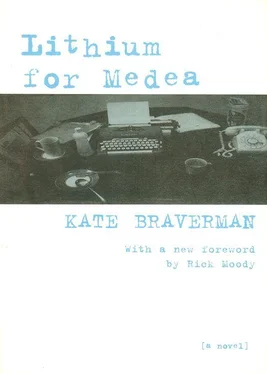Our mothers were born that January night in a charity hospital. Rose took the subway there herself. The city was sheeted by blizzard. Her father, Joseph, got as far as the head nurse. When he heard of the dual birth he spit the evil eye on the hospital corridor floor. Perhaps he shuddered with visions of unspeakable sin.
It’s not uncommon for primitive people to react to the birth of twins with fear or revulsion. Perhaps our great-grandfather saw in the identical red-haired girls the twin horns of some satanic force, some new world demon, stone gray, hard and towering. He refused to see his daughter or the twins again. I think that was the definitive moment, the incident that pushed her into the strange exile she has lived this half century. But then, they say she was never well, not even on the farm in Poland.
Of course, she couldn’t work and take care of the infants by herself. But she tried. She was fifteen years old. She went to the factory each morning and left the infants swaddled old-world style. She kept them nearly two years that way. A welfare worker stumbled on them. They brought Rose documents to sign. She was illiterate. Your mother had temporary blindness from untreated measles. My mother had whooping cough. They were removed by ambulance to the state orphanage.
Our grandmother didn’t realize she had signed away her right of custody. She thought she could get her daughters back. But she never made enough money.
Rose began working as a waitress in the Catskill Mountains. Perhaps she was calmed by some green vision there she never gave a name, not even in Yiddish. Perhaps she was able to walk barefoot on the grass in the late afternoons on her one day off, days she wasn’t carrying the trays of rich soups, steaming meats and potatoes, the trays of chocolate and fat cream pastries.
Rose returned to New York in the off seasons. Our mothers would come from the orphanages on subways on Saturdays. They would sit in her tiny kitchen in the apartment where Rose lived, where Rose still lives.
She had a fascination for geography. Our mothers stole books for her, atlases from libraries. They would sit together in the late afternoons with the maps spread open while Rose traced with her fingertip the exact route she had taken from Krakow to New York, and cursed half the world.
They call themselves orphans. Lies. Our mothers simply choose not to remember those Saturday afternoons when they were six and seven. Years when they stood in the tile courtyard below her brick apartment building and Rose called to them from her sixth-story window and dropped pennies wrapped in pieces of old newspaper down to their outstretched hands.
The chain is long like a string of black pearls. Expensive. Magnificent. But one mustn’t wear it too tight around the throat. One mustn’t choke. We must take it bead by bead, one at a time, and savor the black depths, the gouged black eyes and the shine the color of dried blood.
Rose never took a lover. There was a chef four or five summers in a row who wanted her. But he could not accept her twins and in return she refused him. She was still a teen-ager then, thin and dreamlike. Men must have wanted her. But she felt stained, guilty beyond redemption. There must have been certain temptations during the years of her twenties and thirties as she carried the heavy trays, the meats, the creamy pastries in a sea of starched white linen. Prosperous city merchants with fat bellies must have propositioned her in the carpeted hotel hallways and on the grass near the bungalow where the help slept. But Rose resisted them.
And perhaps her madness was a factor even for men on a holiday. They must have sensed her blackness burning like an open wound and shining in the center of her dark ambery eyes. A certain intensity men find impossible to deal with.
At eight our mothers were sent to foster homes. They did not see Rose again. Our mothers both married during the war. Shortly after that our grandmother woke one day with her legs almost paralyzed. Since that day she has needed a cane to walk and she rarely leaves her apartment and then only under duress.
Is it odd that she should stop walking the year our mothers married? The year our mothers sent her terse announcements of the fact, after the fact? Perhaps on some level she realized fully for the first time that she would never get her daughters back. Perhaps there was no longer a reason to keep walking.
That was years ago. Ever since, she has lived self-contained and crippled, a small bent woman in a miniature invented world in a corner of the city called Washington Heights, with its brick and darkness, the streets and buildings and people. There is a certain smell to rooms inhabited for so many years. You may discover that.
Our mothers have erased her apartment from their memory as simply as an advancing army removes a village, severs it from history by mortar and fire. So in their own way did they bury hers.
Rose lives on a narrow street, one jagged fork from a poor gray boulevard that seems to lead nowhere, seems to be a piece of something immense but now forgotten. One can’t even reconstruct the meaning it might have once contained.
I came by cab. I clutched the address the detective had given me. The little piece of paper was sweat-stained. My hands trembled. Young Puerto Rican and black men leaned against double-parked cars shouting and laughing, tossing coins against brick walls laughing. The air was alive. It was early in the fall. Children played in the apartment courtyard, a square expanse of chipped orangy tiles. As I crossed the courtyard my feet seemed to dig into the tile. They echoed. Voices echoed sharply, flying pointed arrows.
I walked past a sagging wrought-iron gate. I felt as if I was walking into something breathing, not an apartment building but a body still warm. Everything had the quality of echoing. The sunlight fell in bouncing splinters. Radio music filled the gray tile corridors. Bass drums echoed and rumbled and curled on the tiled stairs.
It was six flights up to her apartment. Sixty-seven steps, I counted. Imagine her stumbling up one steep cement plateau to another with her cane and pieces of kosher chicken wings, with her disability checks and crippled legs and her hair dyed red. Yes, she still dyes her hair. She is so crippled she can barely bend her neck forward over her old chipped sink. Still she keeps that one small vestige of vanity, of her girlhood, of some intrinsic and overwhelming necessity. And it occurs to me that when I saw her, she was still only in her early fifties!
The walls lining the corridors leading to her apartment were covered with spray-painted red obscenities in Spanish and English. Even through the thick walls smells drifted, sounds drifted. Dogs barked. Infants squalled. A smell of onions and old meat was draped like a sheet across the building. It was chilly in the corridors, a chill that seemed to cut. I found it hard to breathe.
I knocked on her door breathless, a knapsack on my back. I had taken the Greyhound from Berkeley. I moved randomly, a wind creature not in a hurry. This was seven years ago. The world was different then. Doors had opened then that are closed now, probably forever.
Still I had certain expectations. I wanted a grandmother with a pale blue gingham apron. I wanted still warm from the oven butter cookies in round embossed tins. I wanted my history neat and complete, down to dates and localities, velocities and body counts. I was not prepared for the old woman behind the heavy metal door chain, red-haired and stooped.
The phone rang. My arm leaped out for it, made contact and felt shocked.
“He’s out of the recovery room,” Francine said.
“And?”
“And he’s sleeping. They cut him and he’s sleeping.” Francine paused. “They’re going to take him for tests when he wakes up. If he wakes up.”
Читать дальше












